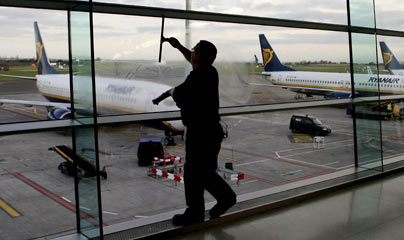
Thousands of foreigners are being allowed to work in high security parts of Britain’s airports without passing proper criminal record checks, it was disclosed last night.
Despite warnings that terrorists would try to recruit people working “airside” in terminals – with direct access to aircraft and baggage – no attempt has been made to check whether foreign workers have committed any offences abroad.
The vetting process checks only for crimes committed in Britain. Foreign workers – arriving from inside or outside the European Union – are not checked in their country of origin.
This means that someone with a conviction for firearms or explosives offences committed abroad could, for example, take a job loading bags on to aircraft at Heathrow, Gatwick or any other airport, provided they had committed no crimes here.
The security lapse was called “absolutely astonishing” by David Davis, the shadow home secretary, who demanded “full and immediate checks”.
Ministers ordered a review of airport security after Samina Malik – the “lyrical terrorist” – was found to have been working in the airside branch of WH Smith at Heathrow. And eight British Muslims are on trial for allegedly plotting to blow up transatlantic airliners using bombs disguised as soft drinks.
The Department for Transport’s head of aviation security said last year that the next terrorist attack “would have the components available airside with the help of people who work there”.
There are an estimated 200,000 staff in the “airside” parts of airports employed in shops, cafes or as cleaners in the departure lounge. Others may be employed as baggage handlers, security guards or driving buses between aircraft and the terminal.
The Government brought in emergency rules in 2003 to improve airport security after September 11. Staff working airside were to be vetted to ensure they had no criminal record and had a checkable employment history for the previous five years.
However, last night’s BBC2 Newsnight disclosed that officials checked only British criminal records – and that no attempt had been made to find out about any crimes in their home countries. Experts said that meant thousands of foreign workers were not vetted properly.
The Government said that it did not want to carry out foreign criminal record checks because it would take too long and involve complicated comparisons between legal systems in different countries.
Mr Davis called for immediate foreign security checks on all people working airside regardless of cost.
“This is astonishing given airside at an airport is one of the most vulnerable and critical security points,” he said. “It is doubly astonishing the Government have let it continue to exist.”
Chris Huhne, the Liberal Democrat home affairs spokesman, said: “It’s crazy to have an elaborate system of checks for British employees but completely ignore potential problems from somebody from another country.”
Asked on Newsnight whether convicted EU terrorists could be working at Heathrow, Jim Fitzpatrick, the transport minister, said: “What we’re absolutely confident of is that any individual who is working at our airports would have to go through the same screening process as anybody who wants to travel or anybody else who is working at our airports to make sure they are safe when they are working in that restricted zone area.”
Pilots called for anyone suspected of having a criminal past to be banned from working airside.
The loophole is the latest in the controversy over foreign nationals. In April 2006, Charles Clarke resigned as home secretary after it emerged that 1,013 foreign prisoners, including sex offenders and murderers, were not deported on release from prison.
Last year the Home Office admitted 11,000 illegal immigrants were working in the security industry.
That came months after it emerged that 27,529 records of British nationals convicted of crimes abroad had been left in box files at the Home Office when they should have been entered on a police database.
This year the Crown Prosecution Service admitted losing 4,000 DNA profiles for more than a year. When the checks finally started in February 2008 since when 15 matches were found. Of these people, 11 are known to have committed offences – some serious – in the UK.
Jim McAuslan, the general secretary of the pilots’ union Balpa, said: “If it’s good enough for pilots it should be good enough for anyone else that’s working airside and these checks need to be carried out on everyone.”
A spokesman for the Department for Transport said all airside workers were required to go through the same checks that passengers have to pass through.
He said: “Enforcing a check on overseas records would require the co-operation of a large number of foreign countries involving delays and complex comparisons of international legal systems.
“It would also have a major impact on an international airport’s day-to-day operations, including preventing many foreign aircrews from landing in the UK.
“However, this practical difficulty should not prevent us from requiring checks of UK records. Neither is such a check required by International Aviation Security bodies.”
A spokesman for the airports operator BAA said: “We work very closely with the Department for Transport and ultimately with the Government to take a view on what security measures are appropriate.”
A spokesman for the industry body, The International Air Transport Association, added that conditions were laid down by national governments. He said that airlines applied whatever checks were required to by their own authorities, but said security was a national responsibility.
By Christopher Hope and David Millward
Last Updated: 12:48PM BST 08/05/2008
Source: Telegraph